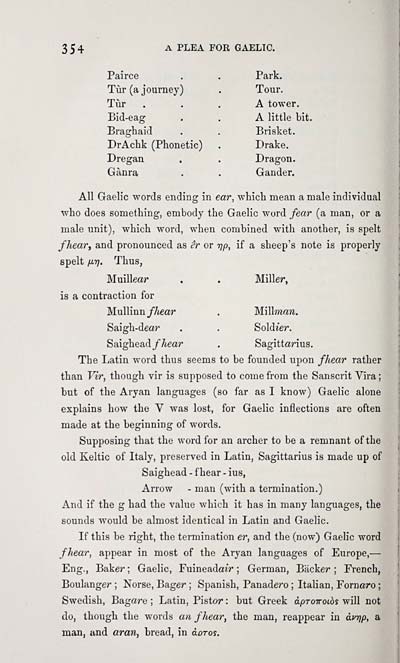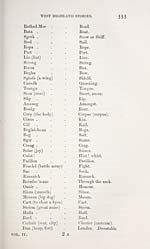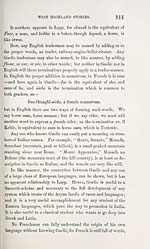Download files
Complete book:
Individual page:
Thumbnail gallery: Grid view | List view

354 ^ PLEA FOR GAELIC.
All Gaelic words ending in ear, wliicli mean a male individual
who does something, embody the Gaelic word fear (a man, or a
male unit), which word, when combined with another, is spelt
/hear, and pronounced as h' or rjp, if a sheep's note is properly
spelt iJLri. Thus,
Muilkar . . Miller,
is a contraction for
Mullinn/Zjear . MUhnan.
Saigh-dea?- . . Soldier.
Saighead/Ziear . Sagittarius.
The Latin word thus seems to be founded upon /hear rather
than Vir, though vir is supposed to come from the Sanscrit Vira ;
but of the Aryan languages (so far as I know) Gaelic alone
explains how the V was lost, for Gaelic inflections are often
made at the beginning of words.
Supposing that the word for an archer to be a remnant of the
old Keltic of Italy, preserved in Latin, Sagittarius is made up of
Saighead - f hear - ius,
Arrow - man (with a termination.)
And if the g had the value which it has in many languages, the
sounds would be almost identical in Latin and Gaelic.
If this be right, the termination er, and the (now) Gaelic word
/hear, appear in most of the Aryan languages of Europe, —
Eng., Baker ; Gaelic, Fuineadair ; German, Backer ; French,
Boulanger ; Norse, Bager ; Spanish, Panadero ; Italian, Fornaro ;
Swedish, Bagare ; Latin, Pistor : but Greek aprowowi will not
do, though the words an fhear, the man, reappear in àvrjp, a
man, and aran, bread, in àoros.
All Gaelic words ending in ear, wliicli mean a male individual
who does something, embody the Gaelic word fear (a man, or a
male unit), which word, when combined with another, is spelt
/hear, and pronounced as h' or rjp, if a sheep's note is properly
spelt iJLri. Thus,
Muilkar . . Miller,
is a contraction for
Mullinn/Zjear . MUhnan.
Saigh-dea?- . . Soldier.
Saighead/Ziear . Sagittarius.
The Latin word thus seems to be founded upon /hear rather
than Vir, though vir is supposed to come from the Sanscrit Vira ;
but of the Aryan languages (so far as I know) Gaelic alone
explains how the V was lost, for Gaelic inflections are often
made at the beginning of words.
Supposing that the word for an archer to be a remnant of the
old Keltic of Italy, preserved in Latin, Sagittarius is made up of
Saighead - f hear - ius,
Arrow - man (with a termination.)
And if the g had the value which it has in many languages, the
sounds would be almost identical in Latin and Gaelic.
If this be right, the termination er, and the (now) Gaelic word
/hear, appear in most of the Aryan languages of Europe, —
Eng., Baker ; Gaelic, Fuineadair ; German, Backer ; French,
Boulanger ; Norse, Bager ; Spanish, Panadero ; Italian, Fornaro ;
Swedish, Bagare ; Latin, Pistor : but Greek aprowowi will not
do, though the words an fhear, the man, reappear in àvrjp, a
man, and aran, bread, in àoros.
Set display mode to: Large image | Transcription
Images and transcriptions on this page, including medium image downloads, may be used under the Creative Commons Attribution 4.0 International Licence unless otherwise stated. ![]()
| Early Gaelic Book Collections > Blair Collection > Popular tales of the West Highlands > Volume 4 > (370) |
|---|
| Permanent URL | https://digital.nls.uk/76370144 |
|---|
| Shelfmark | Blair.176 |
|---|---|
| Attribution and copyright: |
|
| Description | Orally collected, with a translation by J.F. Campbell. |
|---|---|
| Shelfmark | Blair.173-176 |
| Additional NLS resources: | |
| Description | A selection of books from a collection of more than 500 titles, mostly on religious and literary topics. Also includes some material dealing with other Celtic languages and societies. Collection created towards the end of the 19th century by Lady Evelyn Stewart Murray. |
|---|
| Description | Selected items from five 'Special and Named Printed Collections'. Includes books in Gaelic and other Celtic languages, works about the Gaels, their languages, literature, culture and history. |
|---|

